By Amber Cortes
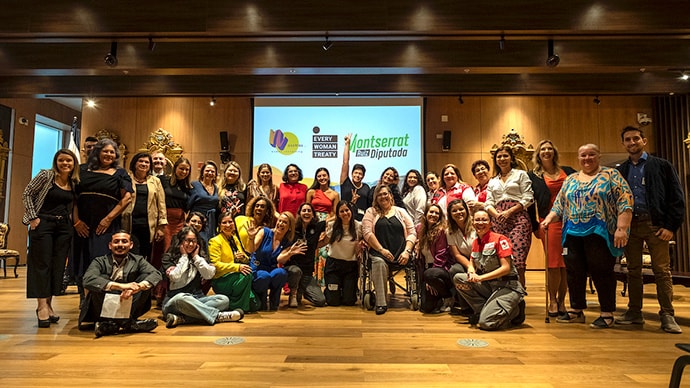
First diplomatic event of the Latin American Coalition. The Latin American Coalition advocating for a new Optional Protocol to CEDAW officially launched in February during an event at the Hall of Presidents at the Legislative Assembly in San José, Costa Rica. The event entitled “A Global Call to Eradicate Violence against Girls, Adolescents, and Women” was hosted by Nosotras Women Connecting, in collaboration with Every Woman Treaty and Congresswoman Montserrat Ruíz. It brought together 81 leaders, activists, congress members, representatives from Costa Rican institutions, and international missions from countries such as Chile, Honduras, Brazil, Canada, and the United States to support the call for a new binding instrument. Photo: Ariela Muñoz for Nosotras Women Connecting
“We are living in a historical moment,” says Patricia Elias, Chief of Global Diplomatic Campaign for Every Woman Treaty, a diverse coalition of more than 3,800 women’s rights advocates working to end violence against women and girls worldwide.
“It’s the start of a new international treaty.”
Elias is talking about a new binding international agreement to end violence against women and girls, a goal that Every Woman Treaty has been working towards for the last ten years.
Every Woman Treaty emerged a decade ago in 2013, spurred by a call for action from various UN bodies, notably the UN Special Rapporteur on violence against women, Professor Rashida Manjoo.
This clarion call gathered a cohort of frontline activists and legal scholars from all over the world, including Somalia, the Democratic Republic of Congo, South Africa, the UK, Afghanistan, the US, Croatia, and Indigenous reservations.
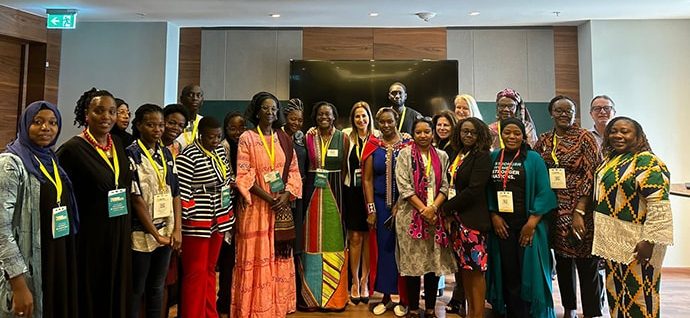
Every Woman Treaty at the Women Deliver conference, Kigali, Rwanda, July 2023. Photo: Every Woman Treaty
Their seminal meeting, hosted at Harvard Kennedy School’s Carr Center for Human Rights Policy, laid bare the stark absence of a binding international norm aimed at eradicating violence against women and girls. Out of this exchange, Every Woman Treaty was born.
Though the Convention on the Elimination of All Forms of Discrimination Against Women (CEDAW), established in 1979, was a milestone in the international advocacy for women’s rights, it initially only addressed issues of discrimination. Women’s rights activists soon found the treaty had omitted explicit references to violence against women, reflecting the prevailing societal attitudes of the time that these were ‘private matters.’
United in a single purpose, Every Woman Treaty advocates to end violence against women and girls through the formulation of a new optional protocol to CEDAW, aligning with General Recommendation 35, to combat gender-based violence more comprehensively.
“Other organizations, they do many things,” says Elias. “But we have only one goal. So this is it. We need a safer world for women and girls.”
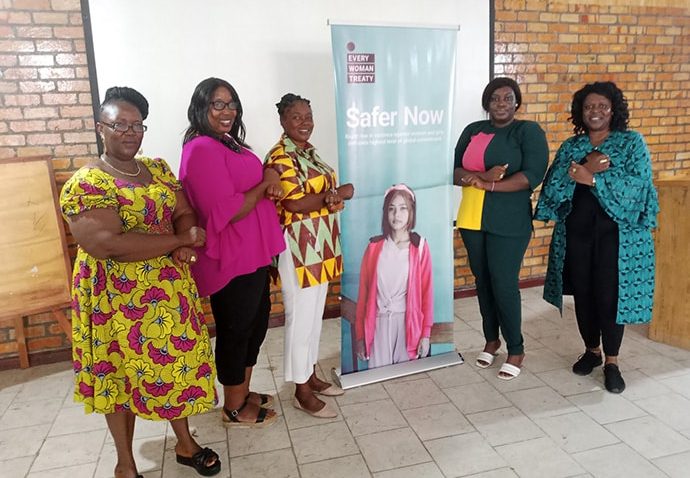
Coalition member Janice Smallwood (Liberia) hosts an event to launch the Safer Now report, February, 2023. Photo: Janice Smallwood Liberia Safer Now launch
Over the years, as awareness about the pervasive nature of gender-based violence grew, so did the need to address this issue on an international level.
As a response, the CEDAW committee created a series of recommendations, including General Recommendation 35, explicitly dedicated to ending violence against women and girls. However, as Elias explains, while these recommendations hold moral weight, they lack the binding force necessary to compel nations to comply.
“The gold standard on eliminating violence against women already exists in General Recommendation 35. But it is not binding to states, and is more like a consensus recommendation.”
And after ten years of deep consultation with 143 nations, Elias says, “it became clear in summer of 2023, when I joined, that the most expedient path to a binding instrument was a new optional protocol to the Convention on the Elimination of all Forms of Discrimination Against Women, which is CEDAW.”
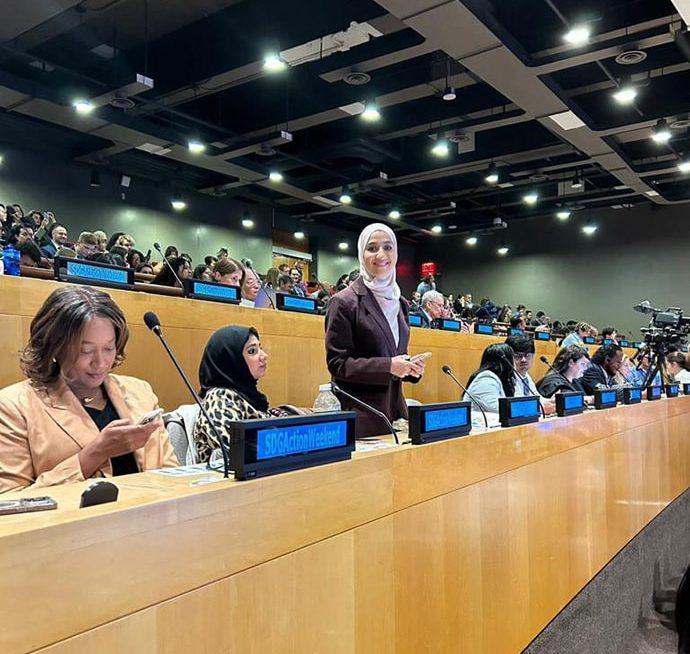
Every Woman Treaty at the United Nations. Photo: Every Woman Treaty
The optional protocol will offer more detailed guidelines for legal reforms and enhanced mechanisms for enforcement or monitoring, which may include implementing training and educational programs, survivor support systems, and submitting periodic reports to comply with the protocol’s provisions.
But most of all, Elias says, having the international treaty defines the standards and terms all nations must abide by. This gives a language and a voice to the struggle survivors have been facing worldwide.
“We need to unify the vocabulary, the notions and sanctions, like femicide and gender apartheid, for the international community to understand that these are crimes.”
Right now, Elias says, though there are regional treaties, they leave almost 75% of women in the world without any binding norms to end violence against women and girls.
“The majority of women don’t know they are under violence,” says Elias. “This is the problem. We want to highlight it, we want to put it out there. We don’t want any country or men or any person committing femicide and escaping, because when you don’t have a name, you are not shaming, you are not saying it out loud.”
“When you start talking about it in the UN internationally, ending violence against women, this will, people will understand. International treaties change minds, mentalities, education… everything.”
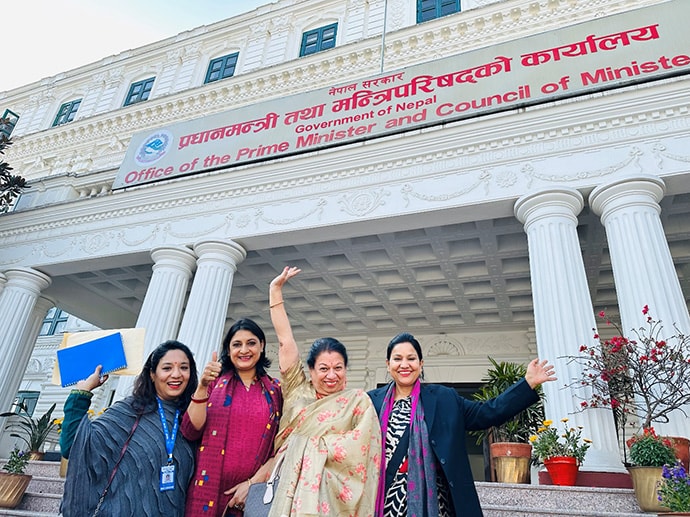
The South Asian Coalition celebrates a successful diplomatic meeting. Photo: South Asian Coalition
Elias believes in laws. She points out two international treaties, included in Every Woman Treaty’s 2023 Safer Now report, that led to clear accountability and cultural change: The Tobacco Treaty shifted the global norm on tobacco from the “right to smoke” to the “right to breathe clean air,” and the Mine Ban Treaty, which was initially deemed as unnecessary, but ended up winning the Nobel Peace Prize in 1997. According to Every Woman Treaty, a global treaty that requires nations to adopt proven interventions will lower rates of violence worldwide. For example, fifteen years after the US passed the Violence Against Women Act, intimate partner violence had dropped 53% and mortality rates for adult women are 32% lower in nations with domestic violence laws.
Every Woman Treaty’s programs are meant to create advocates for the new optional protocol in communities cross the globe. The Every Woman Fellowship fosters the development of leadership capabilities in advocacy, diplomacy, media relations, and storytelling. Complementing this, the Emerging Leaders Council offers mentorship opportunities, enabling 242 young activists to amplify their impact with essential skills like negotiation and public speaking.
And now, Every Woman Treaty’s advocacy efforts from the last ten years are gaining valuable momentum, and an optional protocol is finally on the verge of being a reality. Building upon the foundational achievement of securing a joint statement by Costa Rica, Sierra Leone, the Democratic Republic of Congo, and Antigua and Barbuda, which calls for the establishment of a new optional protocol to CEDAW, Every Woman Treaty is poised to catalyze into further action.
This historic statement is underscored by the endorsement of the current Special Rapporteur on violence against women and girls, alongside three former rapporteurs, marking a rare alignment of influential voices within the UN system.
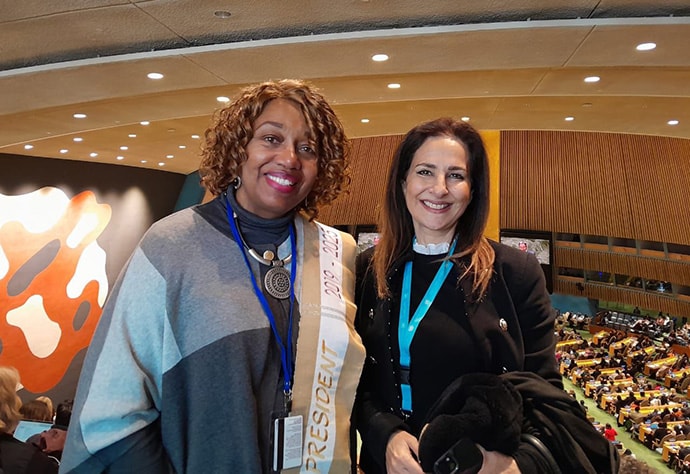
Chief of Diplomatic Campaign Patricia Elias (right) with Ever Woman Treaty Cofounder Dr. Eleanor Nwadinobi at the United Nations Commission on the Status of Women General Assembly, New York, March 2024. Photo: Every Woman Treaty
Forming a new international protocol will not happen overnight, says Elias. It will take some time as the initiative gains traction. The four nations who issued the joint statement will spearhead efforts to formalize the protocol at the upcoming General Assembly in Geneva. Then a dedicated working group will convene to craft the initial draft.
The cultural shift needed will also take some time, but Elias is optimistic that the optional protocol that Every Woman Treaty is working towards will herald a new era of accountability and progress in safeguarding the rights of women and girls worldwide, bringing the UN SDG 5 (achieving gender equality and empowering all women and girls) closer to fruition.
“We need international unified standards, and we want to unify the feminist movement to work against violence against women. And this is what we are doing,” says Elias.